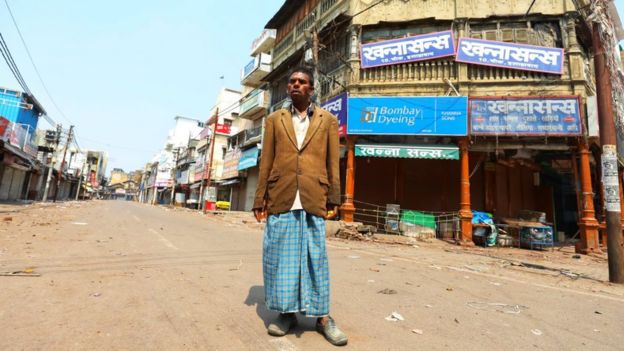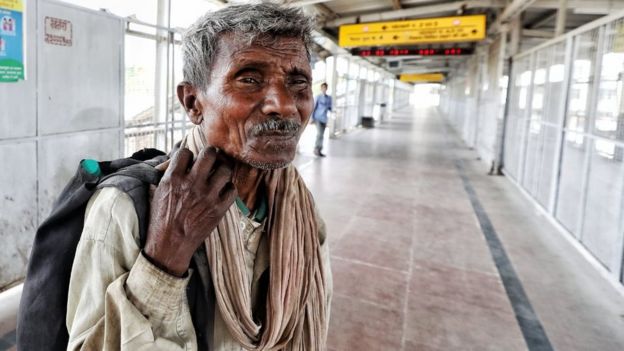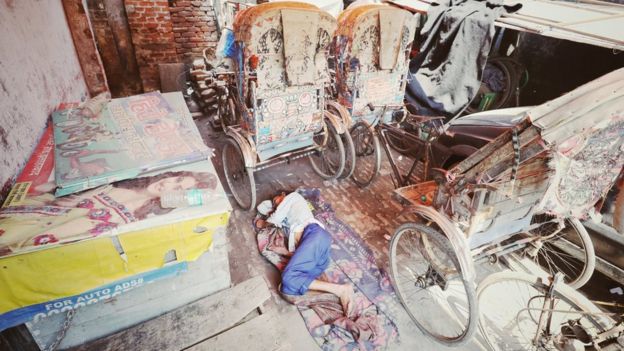India has been put in lockdown to halt the spread of the coronavirus outbreak. People have been told to stay indoors, but for many daily-wage earners, this is not an option.
The BBC's Vikas Pandey finds out how they were coping in the days leading up to Tuesday's announcement.
Labour Chowk in Noida is usually brimming with hundreds of men looking for jobs as construction labourers.
The small intersection of roads in this suburban area of Delhi is a hotspot where builders come to hire workers.
But it was eerily quiet when I drove there on Sunday during the initial lockdown. Everything was still - one could never imagine listening to the sound of birds chirping in such a busy area.
But I did - almost in disbelief.
I soon spotted a group of men huddled in a corner.
I stopped and asked them, from a safe distance, if they were following the lockdown.
Ramesh Kumar, who comes from Banda district in Uttar Pradesh state, said that he knew "there won't be anybody to hire us, but we still took our chances".
"I earn 600 rupees ($8; £6.50) every day and I have five people to feed. We will run out of food in a few days. I know the risk of coronavirus, but I can't see my children hungry," he said.
Millions of other daily-wage earners are in a similar situation. The lockdown announced by Prime Minister Narendra Modi on Tuesday evening means they are now facing no prospect of income for the next three weeks. The likelihood is, some will run out of food in the coming days.

India has reported more than 500 confirmed cases and at least 10 people have died.
Several state governments, including Uttar Pradesh in the north, Kerala in the south and the national capital Delhi, have promised direct cash transfers into the accounts of workers like Mr Kumar. Prime Minister Modi's government has also promised to help daily-wage earners affected by the lockdown.
But there are logistical challenges.
At least 90% of India's workforce is employed in the informal sector, according to the International Labour Organization, working in roles like security guards, cleaners, rickshaw pullers, streets vendors, garbage collectors and domestic helps.
Most do not have access to pensions, sick leave, paid leave or any kind of insurance. Many do not have bank accounts, relying on cash to meet their daily needs.
Lots are migrant workers, which means that they are technically residents of a different state to the one where they work. Then there is the problem of the floating population: people who do not live in any state for a long period as they move around to find work.
Akhilesh Yadav, the former chief minister of Uttar Pradesh, admits these challenges are huge, acknowledging that "nobody in any government has faced them before".
"All governments need to act lightning fast because the situation is changing every day. We need to activate big community kitchens and deliver food to people who need it. We need to hand out cash or rice and wheat - irrespective of who comes from which state," he said.

Mr Yadav is particularly worried about his state, which is India's most populous, with an estimated 220m residents.
"We have got to stop people from travelling to one city from another to avoid community transmission. And one way of doing is to ensure food security. People rush to their villages in times of crisis," he added.
Uttar Pradesh chief minister Yogi Adityanath has said that a team of workers was tracking those who have arrived from other states and everybody who needs help will be supported by his government.
Indian Railways has now suspended all passenger services until 31 March.
But just days before the suspension kicked in on 23 March, hundreds of thousands of migrant workers travelled in packed trains from outbreak-hit cities like Delhi, Mumbai and Ahmedabad to their villages in Uttar Pradesh and Bihar states.
That has heightened the risk of community transmission and experts fear that the coming two weeks are the most challenging for India.
However, not everybody could afford to travel to their villages.
Kishan Lal, who works as rickshaw puller in the northern city of Allahabad, said he had not made any money in the past four days.

"I need to earn to feed my family. I have heard that the government is going to give us money - though I have no idea when and how," he said.
His friend Ali Hasan, who works as a cleaner in a shop, said he had run out of money to buy food.
"The shop shut down two days ago and I haven't been paid. I don't know when it will open. I am very scared. I have a family, how am I going to feed them?" he asked.
Latest Stories
-
George Twum-Barimah-Adu pledges inclusive cabinet with Minority and Majority leaders
42 mins -
Labourer jailed 5 years for inflicting cutlass wounds on businessman
43 mins -
Parliament urged to fast-track passage of Road Traffic Amendment Bill
43 mins -
Mr Daniel Kofi Asante aka Electrician
44 mins -
Minerals Commission, Solidaridad unveils forum to tackle child labour in mining sector
49 mins -
Election 2024: Engagement with security services productive – NDC
50 mins -
Retain NPP for the good of Ghana – Rebecca Akufo-Addo
50 mins -
‘Let’s work together to improve sanitation, promote health outcome’ – Sector Minister urges
51 mins -
Ellembelle MP cuts sod for six-unit classroom block at Nkroful Agric SHS
55 mins -
‘I’ll beat the hell out of you if you misbehave on December 7’ – Achiase Commanding Officer
57 mins -
AFPNC leads the charge on World Prematurity Day 2024
1 hour -
Court remands unemployed man over theft of ECG property
1 hour -
Election security rests solely with the police – Central Regional Police Command
1 hour -
NCCE engages political youth activists at Kumbungu on tolerance
1 hour -
‘In Mahama’s era students lacked chalk, but are now receiving tablets’ – Bawumia
1 hour

